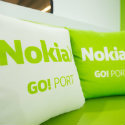Nokia 'Compliance' Issue Immaterial, Still Top 5G Pick – Analyst
An MKM partners analyst thinks the compliance issue Nokia flagged in its annual report will cost less than €125 million ($141 million) and still prefers Nokia to Ericsson in the 5G market.

Nokia's share price has failed to recover after its reference to "compliance" issues in its latest annual report spooked investors at the end of last week. But at least one leading equity analyst thinks those compliance issues will not have any material impact on the company.
Michael Genovese, who covers Nokia for MKM Partners, said in a research note this morning that Nokia is likely to face costs of less than €125 million ($141 million) due to the problems at Alcatel-Lucent, the details of which have not been made available. As Genovese points out, that equals about €0.02 per share for the stock.
Shares in Nokia fell about 5% on Friday, to €5.24 ($5.93) in Helsinki, after the Finnish equipment maker said in its annual report that "compliance issues" at the Alcatel-Lucent business -- which it acquired in 2016 -- "could result in potential criminal or civil penalties, including the possibility of monetary fines, which could have a material adverse effect on our business, brand, reputation or financial position."
Nokia subsequently tried to calm panicky shareholders with a backtracking statement that said an investigation "is not expected to have a material impact on Nokia," but the company's share price dipped further on Monday, to €5.16 ($5.84), and was trading at €5.12 ($5.80) during midday trading in Helsinki on Tuesday.
Genovese has now given his support to Nokia on the compliance matter and said that he continues to prefer the Finnish company to Sweden's Ericsson as a "top pick for 5G." His rationale is that Nokia's broad product portfolio gives it greater exposure to the IP routing, optical and wireline markets -- all of which could benefit as operators make investments to cope with the additional traffic burden that 5G may bring.
He also points out that Ericsson -- whose share price has enjoyed a much bigger boost than Nokia's in the last year -- is also under scrutiny for alleged corruption, as flagged in its third-quarter earnings report last year.
"We prefer Nokia due to its ability to pull through higher-margin IP router sales along with its radio access or wireless sales," said Genovese in his research note. "We also remind investors that Ericsson is facing corruption investigations related to past US sales, and likely will eventually be fined. We only mention this to highlight that neither Nokia nor Ericsson stands above the other on the issue of potential compliance-related fines."
You're invited to attend Light Reading's Big 5G Event! Formerly the Big Communications Event and 5G North America, Big 5G is where telecom's brightest minds deliver the critical insight needed to piece together the 5G puzzle. We'll see you May 6-8 in Denver -- communications service providers get in free!
Trading at 86.16 Swedish kronor ($9.34) in Stockholm this morning, Ericsson's share price has gained about 64% since this time last year, while Nokia's is up just 16% in Helsinki over the same period. Other analysts who have spoken with Light Reading believe Ericsson has the edge in 5G technology and has timed its upgrade cycle well -- even if it lacks the end-to-end portfolio of network products that Nokia can boast.
Ericsson hopes to address that potential shortcoming through 5G transport tie-ups with Juniper and ECI Telecom, announced in September last year. "The partnerships help us strengthen areas where we are not building organically," said Nishant Batra, Ericsson's global head of network products, in a discussion with Light Reading at the time the deal was announced. "Instead of making a blanket commitment to be in IP, we have segmented into radio near, core and edge, and it's the radio-near part we'll address with our own products."
Some observers have seen Ericsson and Nokia as beneficiaries of the US-led backlash against Chinese vendors Huawei and ZTE, which now face restrictions in several countries relating to security concerns about their technologies.
Ericsson has tried to play down the suggestions it stands to profit at Huawei's expense, arguing the current climate has created "uncertainty" that is bad for the entire market.
Various European service providers, meanwhile, have expressed alarm at the possibility of a ban on the use of Chinese vendors, saying this could hold up the deployment of 5G networks and force them to spend billions on replacing equipment.
Related posts:
— Iain Morris, International Editor, Light Reading
About the Author(s)
You May Also Like




_International_Software_Products.jpeg?width=300&auto=webp&quality=80&disable=upscale)







